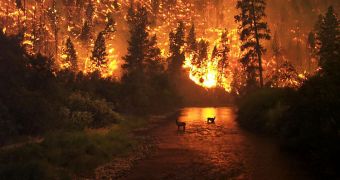The results of a new scientific investigation indicate that the frequency of wildfires sparked around the world has increased by 400 percent since the 1970s, when appropriate records began being kept. Experts are very curious as to whether this phenomenon is connected to global warming or not.
Wildfires are not by far a new occurrence. Geological records indicate that they have been occurring at regular interval all over the planet since at least 400 million years ago. Therefore, it could be set without error that these events are a part of Earth's natural cycles.
This can be observed in the way a forested ecosystems, for example, recovers after even the most brutal wildfire. Trees and vegetations grow back with renewed vigor, which comes from the charred and revitalized soils.
What researchers know for a fact is that instances of such events occur periodically. What causes their frequency to intensify is still unknown, although many suspect a link to man-made global warming.
In the western parts of the United States – an area climate experts warned was at an increased risk of experiencing the full consequences of climate change – the burned areas increased by 600 percent in the past four decades.
At this point, America is paying about $1.5 billion per year on its efforts to fight fire. As such, finding ways of preventing these natural disasters could be more economically-sound than simply waiting for them to happen.
In a paper published in this week's issue of the esteemed Journal of Biogeography, researchers from the National Center of Ecological Analysis and Synthesis (NCEAS) put the roles of wildfires occurring in a natural ecosystem into context.
“We need to look into the past to understand our current and future relationship with fire activity,” NCEAS investigator Jennifer Balch says. She was a part of the international team of experts that conducted this research.
Climate, human ignition sources and cultural practices in particular environments are all important factors to consider when trying to establish how wildfires start. However, the proportions in which each of these factors is responsible for such events is still a mystery.
At this time, the US National Science Foundation (NSF) is financing the team to continue its investigation, which has the potential to uncover numerous useful tips about how to avoid such natural disasters.

 14 DAY TRIAL //
14 DAY TRIAL //